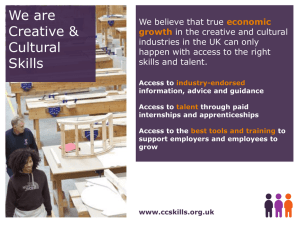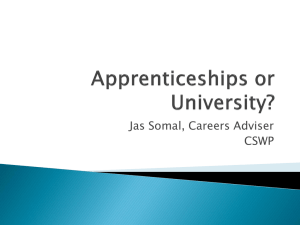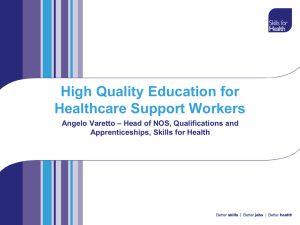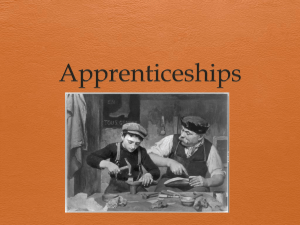A Guide To Careers For Parents and Students
advertisement
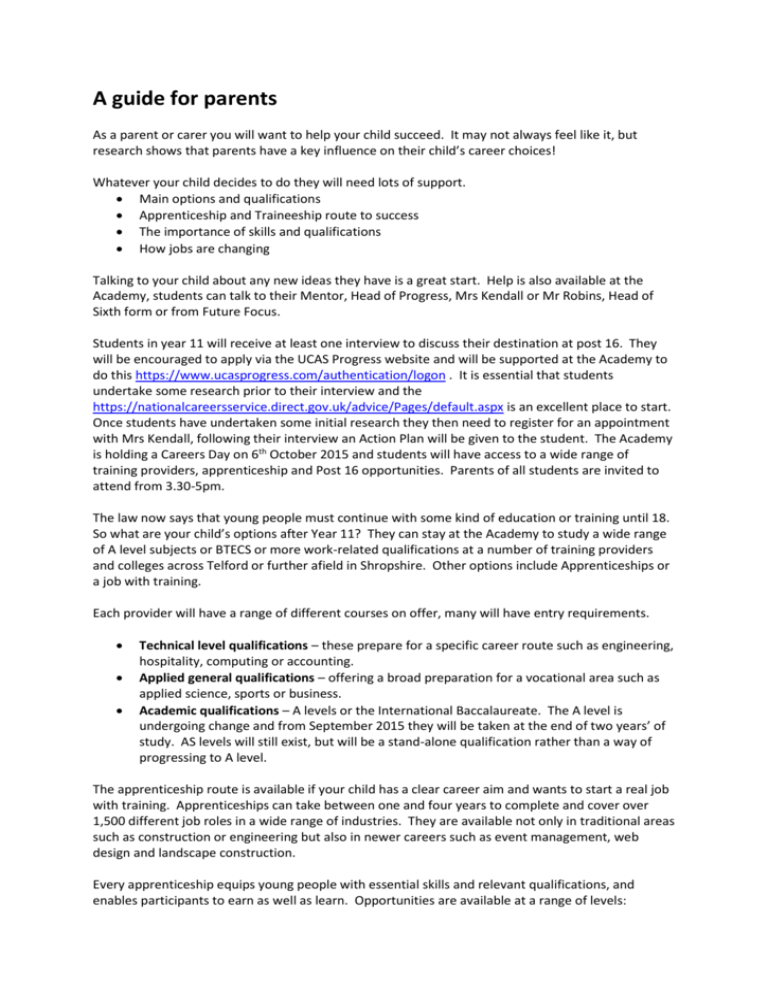
A guide for parents As a parent or carer you will want to help your child succeed. It may not always feel like it, but research shows that parents have a key influence on their child’s career choices! Whatever your child decides to do they will need lots of support. Main options and qualifications Apprenticeship and Traineeship route to success The importance of skills and qualifications How jobs are changing Talking to your child about any new ideas they have is a great start. Help is also available at the Academy, students can talk to their Mentor, Head of Progress, Mrs Kendall or Mr Robins, Head of Sixth form or from Future Focus. Students in year 11 will receive at least one interview to discuss their destination at post 16. They will be encouraged to apply via the UCAS Progress website and will be supported at the Academy to do this https://www.ucasprogress.com/authentication/logon . It is essential that students undertake some research prior to their interview and the https://nationalcareersservice.direct.gov.uk/advice/Pages/default.aspx is an excellent place to start. Once students have undertaken some initial research they then need to register for an appointment with Mrs Kendall, following their interview an Action Plan will be given to the student. The Academy is holding a Careers Day on 6th October 2015 and students will have access to a wide range of training providers, apprenticeship and Post 16 opportunities. Parents of all students are invited to attend from 3.30-5pm. The law now says that young people must continue with some kind of education or training until 18. So what are your child’s options after Year 11? They can stay at the Academy to study a wide range of A level subjects or BTECS or more work-related qualifications at a number of training providers and colleges across Telford or further afield in Shropshire. Other options include Apprenticeships or a job with training. Each provider will have a range of different courses on offer, many will have entry requirements. Technical level qualifications – these prepare for a specific career route such as engineering, hospitality, computing or accounting. Applied general qualifications – offering a broad preparation for a vocational area such as applied science, sports or business. Academic qualifications – A levels or the International Baccalaureate. The A level is undergoing change and from September 2015 they will be taken at the end of two years’ of study. AS levels will still exist, but will be a stand-alone qualification rather than a way of progressing to A level. The apprenticeship route is available if your child has a clear career aim and wants to start a real job with training. Apprenticeships can take between one and four years to complete and cover over 1,500 different job roles in a wide range of industries. They are available not only in traditional areas such as construction or engineering but also in newer careers such as event management, web design and landscape construction. Every apprenticeship equips young people with essential skills and relevant qualifications, and enables participants to earn as well as learn. Opportunities are available at a range of levels: Intermediate Apprenticeships – usually require GCSEs at D or above but if the young person isn’t quite ready for that, there are Traineeships. Traineeships – include work preparation, work experience, maths and English and prepare students for Apprenticeships. Advanced Apprenticeships - usually require 4 GCSEs at A*-C or equivalent. Your child can register for Apprenticeship vacancies on the National Apprenticeship website. Higher Level Apprenticeships Apprenticeships are also available at higher levels and can be entered at 18. They provide an alternative (and cost effective) route to gaining higher level qualifications including a degree. Higher Apprenticeships are a genuine alternative as more and more major companies including Rolls Royce, Capgemini, BT, Jaguar Landrover and Price Waterhouse Coopers start to run these programmes. If your child is considering higher education, this could prove an excellent route. They would obtain higher-level qualifications, gain valuable work experience and skills for their CV and get paid at the same time. Higher level Apprenticeships have been popular in countries like Germany and Switzerland for many years, and are a recognised route into many professions. There is a wide range of higher education provision open to young people with Level 3 qualifications. There are over 37,000 different degree courses and also foundation year courses if your child does not meet the entry requirements for direct entry to a degree. The UCAS website provides a comprehensive source of information and advice about higher education provision. Level Academic Levels 4-6 Degrees Foundation Degrees International Baccalaureate AS & A2 levels A levels Entry = 5/6 GCSEs A*-C minimum GCSEs A* - C Level 3 Advanced Level 2 Intermediate Level 1 Foundation GCSEs D-G General Vocational Higher National Diploma BTEC Level 3 Nationals Entry = 4 GCSEs A*C or Level 2 qualifications BTEC Level 2 Entry = 4 GCSEs D+ and a school report or level 1 qualification BTEC Level 1 Vocational Apprenticeships Professional/ Management Qualifications Level 3 NVQs Higher Apprenticeships Entry = 4 GCSEs A*C or Level 2 qualifications Level 2 NVQs Entry = less than 4 GCSEs A* - C or level 1 qualification and assessment Level 1 NVQs Advanced Apprenticeship Entry = 4 GCSEs A*C or Level 2 qualification + interview Intermediate Apprenticeships Entry = GCSEs D or above or level 1 qualification + interview Traineeship or Preapprenticeship Entry = interview or assessment Entry = interview or assessment Entry = interview or assessment Between the ages of 14 and 18 your child is starting on an important career journey. They can explore different ideas and options and construct a future that makes the most of their interests. It is important they are active and involved in building a future they will be happy with, through making the most of opportunities and developing their employability skills. Skills and qualifications are going to be very important for your child’s future. Whatever they decide to do, and at whatever level, these will be the building blocks for their future. The qualification level required to get a job is set to rise between now and 2020, with most jobs, requiring a minimum of level 2/3qualifications in the future. The careers that your child enters in the future may not exist yet, so it is important that they have a good base of qualifications and skills from which to progress. They must also be aware that they will constantly be learning, adapting and training throughout their career. It is likely they will have many jobs and careers during their working life as the global job market and technology evolves. Encourage and support them to research the entry requirements for careers they are considering, there are a list of useful sources of information below. https://nationalcareersservice.direct.gov.uk There are two channels available to help young people – a helpline available from 8am until 10pm 7 days a week (0800 100 900) an online information on more than 130 industries with 800 different job profiles. www.apprenticeships.org.uk Everything you need to know about Apprenticeships and Traineeships including a vacancy matching service. Your child can register and search for ideal jobs based on postcode, job role or sector. http://www.goodcareersguide.co.uk/ A comprehensive guide for parents, teachers, careers officers, business, employers and others to help young people maximise their potential, make good choices and find and understand the right, fulfilling career for them. www.ucas.com A comprehensive source of information and advice about higher education, offering information on how to choose courses and different types of study. www.moneysavingexpert.com/students/ Straight talking introduction to financing higher education. www.direct.gov.uk/studentfinance Advice and application forms relating to university education. www.parentalguidance.org.uk A website for parents supporting their children with career choice. www.plotr.co.uk Provides games, in-depth articles, insider knowledge and inspirational stories to support career choice and exploration. www.movingonmagazine.co.uk/ Discover careers and qualifications information with Moving On. Moving On website contains lots of great articles about careers and qualifications, as well as our new ‘careerometer’ which allows students to compare wages, working hours and job prospects for different careers that they might be interested in, so it is a great tool for students to access. www.notgoingtouni.co.uk/ The notgoingtouni website has links to live apprenticeship opportunities and so again, is a great tool for students to access. www.thecdi.net The Career Development Institute is the professional body for the career development sector in the UK. In addition to promoting good practice and quality, it maintains the online Register of Career Development Professionals. www.fastomato.com The Academy students have licence to use this site at school or home. The registration code can be obtained from Mrs Kendall or from promotional material in the Academy.

